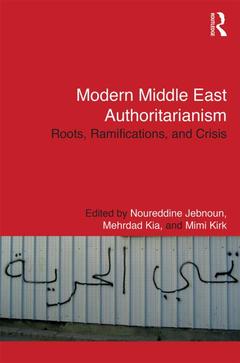Modern Middle East Authoritarianism Roots, Ramifications, and Crisis Routledge Studies in Middle Eastern Politics Series
Coordonnateurs : Jebnoun Noureddine, Kia Mehrdad, Kirk Mimi

While the Arab uprisings have overturned the idea of Arab "exceptionalism," or the acceptance of authoritarianism, better analysis of authoritarianism?s resilience in pre- and post-uprising scenarios is still needed. Modern Middle East Authoritarianism:Roots, Ramifications, and Crisis undertakes this task by addressing not only the mechanisms that allowed Middle Eastern regimes to survive and adapt for decades, but also the obstacles that certain countries face in their current transition to democracy.
This volume analyzes the role of ruling elites, Islamists, and others, as well as variables such as bureaucracy, patronage, the strength of security apparatuses, and ideological legitimacy to ascertain regimes? life expectancies and these factors? post-uprisings repercussions. Discussing not only the paradigms through which the region has been analyzed, but also providing in-depth case studies of Tunisia, Egypt, Libya, Algeria, Saudi Arabia, Iraq, and Iran, the authors arrive at critical conclusions about dictatorship and possibilities for its transformation.
Employing diverse research methods, including interviews, participant observation, and theoretical discussions of authoritarianism and political transition, this book is essential reading for scholars of Middle East Studies, Islamic Studies and those with an interest in the governance and politics of the Middle East.
Introduction: Rethinking the Paradigm of "Durable" and "Stable" Authoritarianism in the Middle East -Noureddine Jebnoun Part I: Entrenched Authoritarianism:An Historical Snapshot 1 Bumpy Democratic Routes to Dictatorial Ends? – Nathan J. Brown 2 The Longevity of Arab Regimes: Causes of Oppression – As’ad AbuKhalil 3 The Making of Modern Authoritarianism in Contemporary Iran-Mehrdad Kia Part II: Authoritarianism’s Coercive Mechanisms 4 The Vanishing Intermediary Bodies of "Authoritarian" Regimes: Legacies of Algerian Student Revolutionaries – Clement M. Henry 5 Ben Ali’s Tunisia: the Authoritarian Path of a Dystopian State – Noureddine Jebnoun 6 Libya’s Authoritarian Tradition – Ronald Bruce St John 7 Political Control in Saudi Arabia: the Avoidance of Democratization– Jean-Francois Seznec 8 Constitutional and Ideological Barriers to Reform in Iran: Is Change Possible Within the Existing System?-Shireen Hunter Part III: Islamism in an Age of Authoritarian Crisis 9 Conditioned Participation: The Mubarak State and Egypt's Muslim Brothers-Joshua Stacher 10 Islamism, Authoritarianism and Democracy: A Comparative Study of Egypt and Iraq- Eric Davis 11 The "Islamic Republic of Iran" and the Crisis of Legitimacy – Ali M.Ansari Conclusion 12 After the "Arab Spring": Emergent Democracy vs. Resurgent Authoritarianism – Michael C. Hudson
Noureddine Jebnoun is a faculty member at Georgetown University’s Center for Contemporary Arab Studies where his teaching interests focus on governance and security challenges of the Arab Middle East and North Africa. He is the author of L’espace méditerranéen: les enjeux de la coopération et de la sécurité entre les rives nord et sud à l’aube du XXIème siècle (2003),as well as many book chapters and articles.
Mehrdad Kia is Director of the Central and Southwest Asian Studies Center and a professor of Middle Eastern and North African history at the University of Montana. Kia has published extensively on the intellectual and cultural history of nineteenth century Iran, as well as the history of the Ottoman Empire. His most recent books are TheOttoman Empire (2008), and Daily Life in the Ottoman Empire (2011) both published by Greenwood.
Mimi Kirk is Research Director at the Middle East Institute in Washington, D.C. Her other co-edited volumes include Palestine and the Palestinians in the Twenty-first Century (forthcoming, 2013); Uncovering Iraq: Trajectories of Disintegration and Transformation (2011); and Industrialization in the Gulf: A Socioeconomic Revolution (2009). Her writing has appeared in Middle East Report, Jadaliyya, and the Atlantic.
Date de parution : 07-2013
15.6x23.4 cm
Disponible chez l'éditeur (délai d'approvisionnement : 14 jours).
Prix indicatif 172,36 €
Ajouter au panierDate de parution : 06-2015
15.6x23.4 cm
Disponible chez l'éditeur (délai d'approvisionnement : 14 jours).
Prix indicatif 58,78 €
Ajouter au panierThème de Modern Middle East Authoritarianism :
Mots-clés :
arab; muslim; arabia; brotherhood; islamic; world; uprisings; republic; spring; saudi; Ayatollah Muhammad Baqir Al Sadr; UN; Vali Ye Faqih; People’s Libyan Arab Jamahiriya; Civil Society; Direct Democracy; Socialist People’s Libyan Arab; Islamic Revolution; Arab Uprisings; Islamic Republic; Guardian Council; People’s Libyan Arab; Reza Shah; Political Party; Muhammad Morsi; Senior Princes; Supreme Jurist; Khomeini’s Views; Hizb Al Wasat; IRI; Prince Nayef; Egypt's Muslim Brothers; Saudi Aramco; Islamic Call Party; Operation Cast Lead



